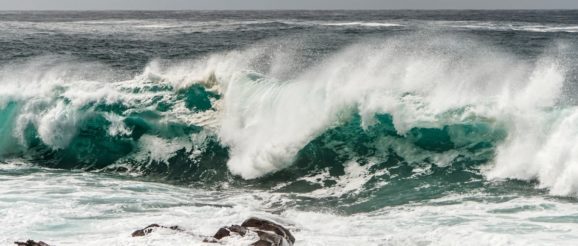Africa: Blue Innovation in the Commonwealth

With 95 per cent of the ocean still unexplored by humans, we are only just beginning to understand its profound influence on life on earth, including its effect on global climate and ecosystems.
As we do so, more and more countries are exploring the immense potential of the ‘blue economy’ to build wealth, create jobs and improve lives, and how this can be done in ways which protect ocean health and promote sustainability.
The value of ocean assets (including natural capital) is conservatively estimated at US$24 trillion, and the worldwide ocean economy is worth around US$2.5 trillion per year. Yet all this is at risk with ocean systems increasingly vulnerable to the negative impacts of climate change, habitat destruction, pollution and overfishing.
Diversification of traditional sectors such as shipping, commercial fishing and ports to make them more sustainable can unlock further opportunities for innovation which, alongside emerging sectors such as offshore renewable energy, offer attractive prospects for impact investors.
The nations of the Commonwealth are particularly rich in such promising opportunities for innovation and investment. Of our 53 Commonwealth countries, 46 have a coastline, 24 are small island developing states, and three border great lakes. More than a third of the world’s national coastal waters and 42 per cent of all coral reefs lie within Commonwealth jurisdictions.
The governments of these countries have come together and adopted the Commonwealth Blue Charter, through which they commit to active cooperation on tackling ocean-related challenges and on fulfilling pledges on sustainable ocean development. Through its Action Group on Sustainable Blue Economy, championed by Kenya, the Commonwealth family of nations is working together to identify good practices, and to connect countries with partners that can help accelerate and scale up such initiatives to make them more attractive to investors.
Examples of innovative developments unfolding in Commonwealth countries are:
Blue fashion: The garment and accessory industries are among the most polluting and wasteful in the world. There has been a surge of interest in how their negative impact can be reduced through the use of marine materials to develop bio-alternatives that are more sustainable and which also add value.
In Kenya, for example, designers and manufacturers are excelling in the US$50 billion African fashion industry, producing high quality fish leather items made from discarded fish skin. To showcase this, the Commonwealth recently worked with partners to stage a ‘blue fashion show’ in Nairobi, and similar international initiatives are being considered.
Blue bonds and debt swaps: Seychelles has pioneered a number of innovative financing mechanisms, including a ‘debt swap’ programme, supported by the Nature Conservancy. The project has seen US$30 million of Seychelles’ foreign debt exchanged for commitments to ocean conservation programmes.
Seychelles also launched the world’s first sovereign ‘blue bond’ last year, raising US$15 million from international investors. Of this, US$3 million is earmarked for grants to support blue economy development and climate change adaptation projects, disbursed through the Seychelles Conservation and Climate Adaptation Trust. The remaining US$12 million provides loans for blue economy projects through the Seychelles Development Bank.
The Commonwealth Fund for Technical Cooperation supported Seychelles in developing its strategic policy framework on the blue economy for the period 2018 to 2030, termed the ‘Blue Economy Roadmap’ and Commonwealth advisers continue to assist with implementation.
Alternatives to plastics: A growing number of countries, including the UK and Vanuatu as co-champions of the Commonwealth Blue Charter Action Group on Marine Plastic Pollution, have banned or are planning to ban various forms of single-use plastics. Investment and research towards developing more affordable and readily available sustainable alternatives will help such initiatives to succeed and become adopted more widely.
Recognising this, the Association of Commonwealth Universities, through the Blue Charter Fellowship programme, is sponsoring research by a scientist in Bangladesh on coconut husk cutlery as a substitute for plastic knives and forks. The project includes market analysis and development of policy options by which the government could encourage adoption of the product.
Already, 48 emerging scientists have been awarded Blue Charter fellowships at top Commonwealth universities to explore innovative ways of tackling marine plastic pollution.
Such examples demonstrate how promising and practical opportunities are already being developed. Substantial technical support and financial backing within robust regulatory environments are essential if there is to be the kind of far-reaching impact that is really needed. To achieve this, it will be necessary for countries to adopt ‘whole-of-government’ approaches to the blue economy, embedding the concept in national development strategies, and engaging all sectors rather than a single agency.
Sign up for free AllAfrica Newsletters
Get the latest in African news delivered straight to your inbox
By submitting above, you agree to our privacy policy.
Success!
Almost finished…
We need to confirm your email address.
To complete the process, please follow the instructions in the email we just sent you.
Error!
There was a problem processing your submission. Please try again later.
The Commonwealth and UNCTAD toolkit on youth entrepreneurship in the blue and green economy offers guidance for policymakers in formulating comprehensive national strategies, with a focus on optimising the regulatory environment and improving business skills.
Transition from traditional maritime economies to sustainable blue economies takes time to achieve, but important groundwork is already being laid. By working together in mutual support and cooperation, Commonwealth countries are helping to accelerate progress towards economic growth and prosperity which, through imaginative and innovative approaches, is harmonised with sustainable use and good stewardship of our ocean and its resources.
To find out more about the Commonwealth Blue Charter, visit: https://bluecharter.thecommonwealth.org/
This piece was first published on www.17globalgoals.com
